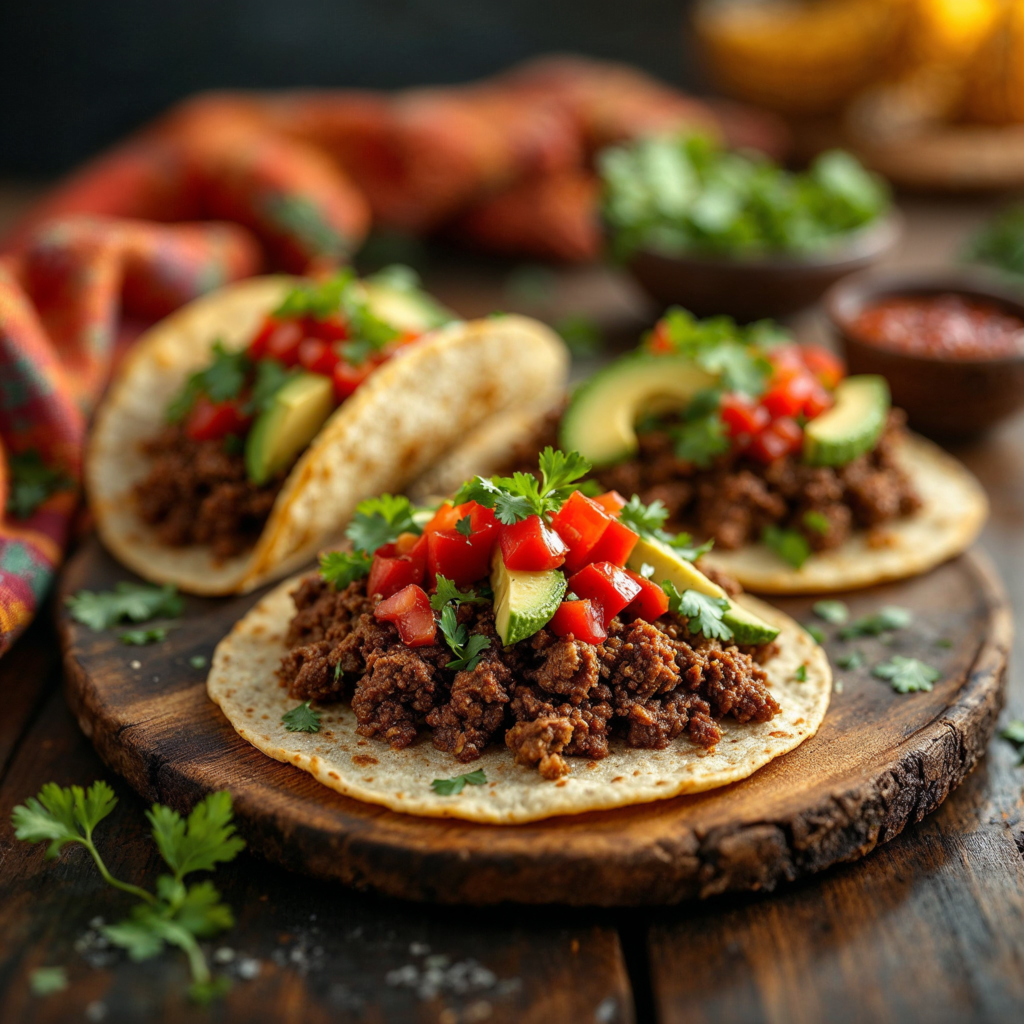Introduction
Can You Substitute Ground Bison for Ground Beef?
Ground beef has long been a kitchen staple, featured in everything from classic burgers and meatloaf to hearty pasta dishes and savory casseroles. However, as consumers grow increasingly conscious about nutrition and sustainability, alternative proteins like ground bison are becoming more popular.
But can ground bison really replace ground beef in your recipes without sacrificing flavor or texture? This article explores the key differences between these two ground meats, focusing on nutritional content, cooking techniques, and practical tips for substitution. You’ll also discover how to adjust recipes for the leaner profile of bison and why it might be worth making the switch.
By the end of this guide, you’ll have a clear understanding of whether ground bison is the right choice for your next culinary adventure. Whether you’re aiming for healthier meals or just curious to try something new, this detailed comparison will provide everything you need to make an informed decision.
“Try this hearty bison chili recipe for a nutritious and delicious meal.”
Why Substitute Ground Bison for Ground Beef?
Nutritional Benefits of Ground Bison
One of the primary reasons people consider substituting ground bison for ground beef is its superior nutritional profile. Ground bison is often praised for being leaner and higher in protein while still offering essential nutrients like iron, zinc, and vitamin B12.
- Lower Fat Content:
Ground bison contains significantly less fat than traditional ground beef, particularly if you’re using beef with a higher fat percentage like 80/20 (80% lean, 20% fat). This lean quality makes bison an excellent choice for individuals watching their calorie intake or looking to reduce saturated fats in their diet. - High Protein Levels:
Despite being leaner, bison delivers a robust protein punch. Protein is vital for muscle repair, energy production, and maintaining healthy hair, skin, and nails. If you’re an active individual or athlete, bison can be a fantastic source of high-quality protein. - Rich in Iron and Vitamin B12:
Like beef, bison is an excellent source of heme iron, which is more easily absorbed by the body than the iron found in plant-based foods. This makes it ideal for those at risk of iron deficiency. Additionally, bison provides ample amounts of vitamin B12, essential for energy production and red blood cell formation.
“Explore versatile recipes using ground bison, from tacos to burgers.”
Flavor and Texture Differences
Ground bison offers a flavor profile that stands apart from beef while still being versatile enough to complement most recipes.
- Richer, Sweeter Flavor:
Bison has a slightly sweeter and richer taste than beef. It lacks the sometimes heavy, greasy flavor associated with fattier cuts of beef, which can make it feel lighter on the palate. - Lean and Firm Texture:
Due to its lower fat content, ground bison tends to have a firmer texture than ground beef. This characteristic is particularly noticeable in dishes like burgers and meatballs, where fat typically helps bind the ingredients.
Environmental and Ethical Considerations
For environmentally conscious consumers, ground bison also holds appeal due to its sustainable and ethical farming practices.
- Sustainable Farming:
Bison are often raised on grass-fed diets and managed in eco-friendly ways that prioritize preserving natural habitats. Their grazing habits can even promote healthier grasslands and ecosystems. - Ethical Treatment:
Bison farming typically involves less intensive practices compared to industrial beef farming, with animals often raised in free-range or pasture settings. For those who value animal welfare, bison can be a more humane option.
Nutritional Comparison – Can You Substitute Ground Bison for Ground Beef?
Calorie and Fat Content
When comparing ground bison to ground beef, one of the most significant differences lies in calorie and fat content.
- Calorie Comparison:
A 3-ounce serving of cooked ground bison contains approximately 152 calories, while the same serving of 80/20 ground beef provides around 215 calories. For those managing calorie intake, bison offers a lower-calorie option without sacrificing flavor. - Fat Content:
Ground bison is significantly leaner than most commercially available ground beef. While bison typically contains about 2-4 grams of fat per serving, ground beef can range from 10-20 grams, depending on the fat percentage. This makes bison a preferred choice for those looking to reduce overall fat consumption, particularly saturated fats, which are associated with higher cholesterol levels and heart disease risk.
Protein Content and Quality
Bison and beef are both rich in protein, but bison offers a slight edge in lean protein content.
- Protein Levels:
A 3-ounce serving of ground bison delivers around 22 grams of protein, slightly higher than ground beef, which provides 20 grams in the same serving.- Why It Matters: Protein is essential for maintaining muscle mass, repairing tissues, and producing enzymes and hormones. For athletes and fitness enthusiasts, the higher protein content in bison can be especially beneficial.
- Amino Acid Profile:
Both meats provide a complete amino acid profile, making them excellent sources of high-quality protein. This ensures you get all nine essential amino acids that your body cannot produce on its own.
Vitamins and Minerals
Bison and beef are nutrient-dense foods, but bison stands out in a few key areas.
- Iron:
Both meats are excellent sources of iron, but bison contains slightly more. Iron is crucial for producing hemoglobin, which transports oxygen in the blood. This makes bison an excellent choice for individuals prone to anemia or those needing an iron boost. - Vitamin B12:
Bison is rich in vitamin B12, providing up to 2.4 micrograms per serving, which is close to the daily recommended intake for most adults. B12 is vital for energy production, nerve function, and DNA synthesis. - Zinc and Selenium:
Bison and beef both offer healthy amounts of zinc and selenium, essential for immune function and antioxidant protection. However, bison has a slight edge due to its naturally lean and nutrient-dense composition.
Omega-3 and Omega-6 Fatty Acids
Grass-fed bison tends to have a healthier balance of omega-3 to omega-6 fatty acids compared to conventionally raised beef.
- Omega-3 Benefits:
Omega-3 fatty acids support heart health, reduce inflammation, and contribute to brain function. Grass-fed bison may contain higher levels of omega-3s due to its natural diet.- Omega-6 Fatty Acids: While necessary in moderation, excessive omega-6 consumption (often found in grain-fed beef) can lead to inflammation. Bison provides a better balance for those seeking anti-inflammatory benefits.
Cooking with Ground Bison

Adjusting Recipes for Bison
Ground bison can be used as a direct substitute for ground beef in most recipes, but its leaner composition requires some adjustments to ensure the best results.
- Cooking Temperature:
Bison cooks faster than beef due to its lower fat content. To avoid overcooking, use a meat thermometer and cook ground bison to an internal temperature of 160°F (71°C). Overcooking can make it dry and tough. - Adding Moisture:
To compensate for the lack of fat, consider adding moisture-rich ingredients to your recipes. For example:- Incorporate grated vegetables like zucchini or carrots into meatloaf or burgers.
- Use an egg or a small amount of olive oil as a binder for patties.
- Add sauces or broths when making bison chili or stews.
- Seasoning Considerations:
Bison has a naturally rich and slightly sweet flavor, so it requires less seasoning than beef. A simple mix of salt, pepper, garlic, and onion works well. For bolder dishes, try pairing bison with spices like paprika, cumin, or chili powder.
“Discover how bison adds a flavorful twist to classic cowboy chili.”
Best Dishes for Bison
Ground bison’s versatility makes it suitable for a wide range of dishes. Here are some popular options:
- Bison Burgers:
A classic choice, but due to its leanness, bison burgers should be cooked medium-rare to medium for the best flavor and texture. Adding a slice of cheese or a dollop of sauce can enhance juiciness. - Chili and Stews:
Ground bison’s robust flavor shines in hearty, slow-cooked dishes. The lean meat absorbs spices and broth well, making it ideal for chili or stews. - Tacos and Sloppy Joes:
Ground bison can be seasoned with taco spices or tangy barbecue sauces for dishes like tacos, burritos, or Sloppy Joes. - Pasta Sauces:
Substitute ground bison for beef in Bolognese or marinara sauces. Its rich flavor pairs perfectly with tomatoes and herbs. - Meatballs and Meatloaf:
Ground bison works well in meatballs or meatloaf when mixed with breadcrumbs, eggs, and seasonings to retain moisture.
Common Cooking Mistakes
Cooking with bison can yield delicious results, but there are some pitfalls to avoid:
- Overcooking:
The biggest mistake when cooking bison is overcooking. Its low-fat content means it cooks faster than beef and is more prone to drying out. - Neglecting Rest Time:
After cooking, let bison rest for a few minutes to allow juices to redistribute. This step enhances both flavor and texture. - Skipping Moisture Enhancements:
Unlike beef, bison benefits from added moisture. Skipping this step can result in a dry, crumbly texture in burgers or meatloaf. - Seasoning Too Heavily:
Bison’s natural flavor is delicate yet rich. Over-seasoning can overpower its unique taste.
Flavor Enhancements and Pairings

Spices and Marinades for Bison
Ground bison’s rich yet subtle flavor benefits from thoughtful seasoning. Its natural sweetness allows it to pair well with a wide range of herbs, spices, and marinades.
- Classic Seasoning Combinations:
- Salt, black pepper, garlic powder, and onion powder for a simple yet flavorful blend.
- Add smoked paprika or chili powder for a smoky, spicy kick.
- Mediterranean Flavors:
Bison pairs beautifully with oregano, thyme, rosemary, and a splash of olive oil. Use these in meatball or burger recipes for a Mediterranean twist. - Asian-Inspired Seasonings:
Incorporate ginger, soy sauce, sesame oil, and green onions for dishes like stir-fry or lettuce wraps. - Marinades for Tenderness:
Because bison is lean, marinating it before cooking can enhance flavor and tenderness. Marinades with acidic components like lemon juice, vinegar, or yogurt work particularly well.
Side Dishes and Accompaniments
Choosing the right side dishes can elevate a bison-based meal.
- Hearty Vegetables:
Roasted root vegetables like carrots, parsnips, and sweet potatoes complement bison’s earthy flavor.- Steamed or grilled asparagus and broccoli also pair well for a lighter option.
- Grains and Starches:
- Creamy mashed potatoes or a baked potato with sour cream and chives make a comforting pairing.
- For a healthier alternative, try quinoa, wild rice, or couscous.
- Salads and Greens:
A fresh salad with arugula, cherry tomatoes, and a balsamic glaze adds brightness to balance the richness of bison dishes.- Sauteed spinach or kale with garlic can provide a nutrient-packed side option.
Beverages and Sauces
Pairing beverages and sauces with bison enhances the overall dining experience.
- Recommended Beverages:
- Red Wine: A medium-bodied red like Merlot or Zinfandel complements bison’s robust flavor without overpowering it.
- Beer: A malty ale or lager pairs well with bison burgers and stews.
- Sauces to Complement:
- A red wine reduction or mushroom gravy for bison steaks or meatloaf.
- Barbecue sauce or aioli for burgers and sliders.
- A tzatziki sauce or mint yogurt for Mediterranean-inspired dishes.
FAQs About Substituting Ground Bison for Ground Beef
Can I use ground bison instead of ground beef?
Yes, ground bison can be used as a substitute for ground beef in almost any recipe. Its lean, nutrient-rich profile makes it an excellent choice for dishes like burgers, tacos, chili, and meatloaf. However, because bison has less fat than beef, it cooks faster and can dry out if overcooked. Adding moisture-enhancing ingredients, such as eggs or grated vegetables, and cooking at lower temperatures can help maintain its juiciness.
Can bison be substituted for beef?
Absolutely, bison can substitute for beef in virtually all recipes. From hearty casseroles to pasta sauces, bison’s versatility makes it a great alternative. Its rich yet mild flavor is comparable to beef but lighter, which many people find appealing. Keep in mind that its lean nature may require adjustments in cooking techniques, such as reducing cooking time or adding a source of fat for tenderness.
What is the best substitute for ground beef?
Ground bison is one of the best substitutes for ground beef due to its similar flavor profile and versatility. Other great alternatives include ground turkey, chicken, pork, or plant-based options like soy-based crumbles or lentils, depending on dietary preferences. Bison stands out for its high protein content, lower fat levels, and rich taste, making it ideal for health-conscious consumers.
Does ground beef taste the same as bison?
Ground bison and ground beef have similar flavors, but they are not identical. Bison has a richer, slightly sweeter, and less greasy taste than beef, which many find more refined. The difference is subtle, making bison a good choice for those who enjoy beef but want a leaner or more distinctive option.
Conclusion
Ground bison is an excellent substitute for ground beef, offering a leaner, more nutrient-dense alternative that can enhance both the flavor and health benefits of your meals. While it does require slight adjustments in cooking techniques to account for its lower fat content, ground bison’s versatility makes it a great choice for a variety of dishes, from burgers and tacos to pasta sauces and chili.
In addition to its culinary benefits, bison is a sustainable and ethical protein option, appealing to those looking for environmentally friendly food choices. With its rich flavor, high protein content, and essential vitamins and minerals, ground bison can be a valuable addition to any diet.
Whether you’re aiming to reduce saturated fats, try something new, or support sustainable farming practices, ground bison is a worthy contender in the kitchen. Experiment with it in your favorite recipes, and you might discover a new staple protein to enjoy for years to come.

